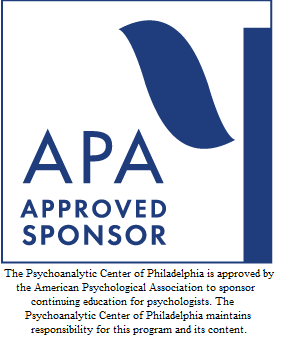- Home
- Training & Applications
- Calendar of Events
- Find a Therapist
- Membership
- Payments & Donations
Adult Psychoanalytic Program: DetailsFor a full listing of all formal courses offered by the Psychoanalytic Center of Philadelphia, follow the link below: The curriculum for training in psychoanalysis is tripartite, including: the personal analysis, supervised clinical work, and didactic seminars. The Center has a well-respected, scholarly faculty that ably conveys the complexity of psychoanalytic thinking today. The didactic curriculum consists of a series of seminars, given weekly over five years, designed to impart a thorough knowledge of psychoanalytic theory beginning with Freud’s discovery of the unconscious mind and encompassing conflict theory, ego psychology, object relations theory, perspectives on narcissism, and relational theory. The curriculum keeps abreast of contemporary issues such as gender theory, trauma theory, research in child development, and findings in neuroscience. Technique is taught in seminars and in Continuous Case Conferences, in which a single case is followed over the duration of the course. Development from infancy to adulthood is studied in a six-course sequence. Years Four and Five study special topics in Advanced Electives. An active Curriculum Committee reviews courses and explores ways in which new areas of knowledge may be incorporated into the program. Candidate representatives participate as voting members on the Curriculum Committee. Classes are held weekly on Wednesdays at Rockland Mansion, E. Fairmount Park, 3810 Mt. Pleasant Drive, Philadelphia, PA 19121. Starting and ending times of classes vary from year to year.
Personal Psychoanalysis
The personal psychoanalysis is the foundation for all subsequent professional training in psychoanalysis. Its objectives include gaining an awareness of unconscious processes and developing the skills and capacities for empathy, insight, and object relatedness necessary for personal development as a psychoanalyst. Inherent in these objectives is the goal of addressing conflictual matters that might interfere with the practice of psychoanalysis. It is indistinguishable from a therapeutic analysis and thus offers the candidate an opportunity to understand the process from the patient’s vantage point, as well as the chance to work through one’s own personal difficulties, conflicts, and blind spots. The duration of the personal analysis depends on the needs of the individual and shall be determined by the candidate and training analyst. It is the experience of the majority of training analysts that five analytic sessions a week constitute the preferred conditions for the continuity of the analysis, with four analytic sessions a week as the minimum. Supervised Clinical Work
The focus of supervision is to learn to identify the presence of unconscious forces in the mental life of patients and to use psychoanalytic techniques to resolve neurosis and promote mental health as well as to understand the role of transference and counter-transference in treatment. Candidates are required to conduct at least three psychoanalyses (4-5 sessions per week) under supervision. It is expected that most candidates will be ready to begin supervised clinical work after the Introductory Technique course and their personal analysis is underway. While there are exceptions, it is strongly recommended that supervisory experiences occur weekly for each case. Low fee supervision is available for 180 hours of supervision. The PCOP Consultation and Referral Service can act as a source of psychoanalytic case referrals for candidates. The Institute also offers an individual case development mentoring to aid in the development of an analytic practice. Case reports are required every six months on each training case, and a full case write-up is required on one case. Write-ups should be submitted to supervisors for feedback. The capacity to write about one’s work is an important component in the preparation for post-graduate development, which may include certification in psychoanalysis. Candidate Progression
The Progression Committee, a subcommittee of the Education Committee, is responsible for the ongoing evaluation of a candidate’s progress in training. Each candidate will be assigned a faculty Advisor as a liaison between the candidate and the Progression Committee. The Advisor is also available to discuss issues related to courses or clinical work. Candidates will also be paired with a faculty Mentor from whom advice and support may be sought throughout their training. The mentor relationship is fully confidential and free from reporting to the Progression Committee. The Institute requires that the following criteria be met for a candidate to graduate: a minimum of 300 hours of supervision be satisfactorily completed or a minimum of 7 case years; a minimum of three adult cases in four times per week treatment, at least one male and one female; and an ability to exhibit an understanding of analytic process and technique in their written work. One case must be supervised into the termination phase of analysis, or for a minimum of four years. It is expected that a candidate will be in his/her personal analysis for a significant period of time during the course of his/her clinical work. Shortly after the candidate begins the third case, the Progression Committee will review the candidate’s record and discuss any further requirements for graduation with the candidate. The Education Committee, to whom the Progression Committee reports, may require that further supervised work be undertaken. The ultimate decision regarding graduation from the Division of Adult Psychoanalysis depends on an evaluation of the candidate’s clinical work by the Progression Committee and approval by the Education Committee. |

 Continuing Education for Psychologists (CE):
Continuing Education for Psychologists (CE):